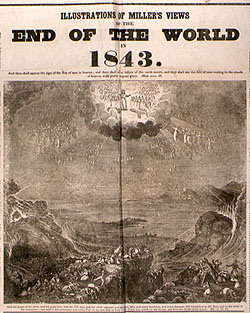 William Miller -- Frontispiece to Memoirs of William Miller, by Sylvester Bliss (Boston: J. V. Himes, 1853) |
The End of the WorldIn the late 1820s, based on his own readings of the Bible's prophetic books, William Miller arrived at the conviction that Jesus would return to the earth "about 1843." In the early 1830s he reluctantly decided that God wanted him to spread the news of the "advent near" to others. First in the rural areas of New York and New England, but by the end of the decade in the major cities of the East, he proved to steadily increasing audiences of Protestants from many denominations that the end of the world was almost at hand. By 1843, probably over one million people had attended the Millerites various camp meetings, and between 50,000 and 100,000 of these were persuaded to bring their earthly affairs to an end by October 22, 1844 -- the date ultimately announced as the day the saints would be translated to the New Jerusalem while the world perished in fire beneath them. There were a number of other millenialist movements in America in the 1830s and 1840s, including the Shakers, the Perfectionists and the Mormons. But the Millerites most dramatically represent the period's widely shared belief in an immiment apocalypse. |

